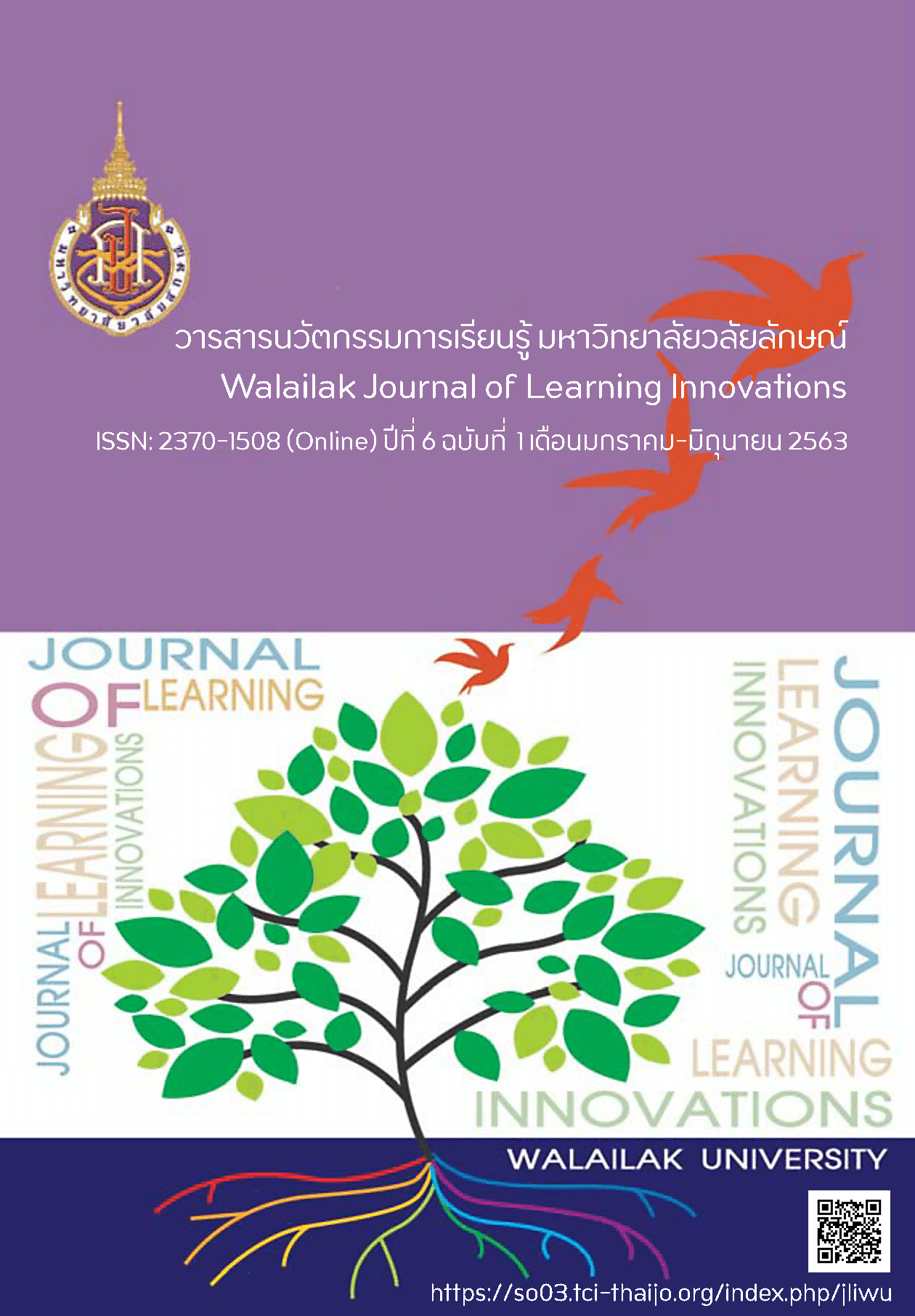Effect of Research-Based Learning Activity to Enhance Active Learning Behavior for Science Student’s Teachers
Keywords:
Research-based learning, Active learning, Science student teacher, behavior, Learning behaviorAbstract
This research aims to study the effect of research-based learning activity to enhance an active learning behavior for science teacher students. This study employed pre-experimental research design which using a sequential explanatory mixed-method approach. The targets were composed of 44 third year science student teachers. Research instrument were lesson plan which designed by using research-based learning activity for electricity and energy course (evaluated as very good quality; = 4.74, S.D. = 0.36) and questionnaire which comprised of check-list form and open ended answer (IOC = 0.98), before and after research-based learning activity. The quantitative data was analyzed by using simple statistic. The other way, the qualitative data were analyzed by inductive content analysis. The result found that the inclusion of student with research-based learning activities was able to promote science students teachers learn with more active learning behaviors, especially, learning with a collaborative group and learning with the presentation of new knowledge which discovered by themselves to friends in the class. This result correlate to the results of the qualitative data analysis, the students' active learning pattern tends to change to be a project-based learning or research-based learning. This learning activity is a group activity that is not limited to the classroom, and also accomplishing with research findings or project presentations in this learning activity.
References
Brahmawong, C. (2013). Kānthotsō̜p prasitthiphāp sư̄ rư̄ chut kānsō̜n [Developmental testing of media and instructional package]. Silpakorn Educational Research Journal, 5(1), 7-20.
Charoenrat, J. & Nillapun, M. (2014). Kānphatthanā khwāmsāmāt nai kān khit wikhro̜ læ thaksa krabūankān thāng witthayāsāt samrap nakrīan chan matthayom masưksā pī thī sām thī sō̜n dūai withī sō̜n bǣp khrōng ngān [The develop- ment of analytical thinking ability and science process skills for ninth grade students taught by project approach]. Silpakorn Educational Research Journal, 6(2), 182-194.
Creswell, J. W., & Plano Clark, V. L. (2011). Designing and conducting mixed methods research. Thousand Oaks, CA: Sage Publicaitons.
Dechakupt, P., & Yindeesuk, P. (2015). Kānčhatkān rīanrū nai satawat thī yīsipʻet , Phim khrang thī 2. [The 21st century learning management, 2nd ed.]. Bangkok, Thailand: Chulalongkorn Publishing.
Driscoll, M. P. (2000). Psychology of learning for instruction (2nd ed). Boston, MA: Allyn and Bacon.
Faikhamta, C. (2012). Khwāmrū nai nư̄ahā phanūak withī sō̜n phư̄a kānsō̜n thamma
chāt khō̜ng witthayāsāt [Pedagogical content knowledge for teaching nature of science]. KKU Research Journal, 2(2), 233-260.
Faikhamta, C. (2016). Khwāmkhaočhai kīeokap thammachāt khō̜ng witthayāsāt khō̜ng naksưksā khrū witthayāsāt nai khrōngkān songsœ̄m kānphalit khrū thī mī khwāmsāmāt phisēt thāng witthayāsāt læ khanittasāt (sō̜ khō̜ wō̜ khō̜) [PSMT pre-service science teachers’ understandings of nature of science]. Journal of Education, Prince of Songkla University, Pattani Campus, 27(2), 21-37.
Howes, E. V. (2008). Educative experiences and early childhood science education: A deweyan perspective on learning to observe. Teaching and Teacher Education, 24(3), 536-549.
Kammanee, T. (2005). Kānčhatkān rīanrū dōi phū rīan chai kānwičhai pen sūan nưng khō̜ng krabūankān rīanrū [Learning management by students using research as part of the learning process 2nd ed.]. Bangkok, Thailand: Book and Academic Document Center, Chulalongkorn University.
Klanpoomsri, Y., Watanapa, A., Ruayruay, E., & Wiyarat, W. (2017). Kān prap plīan hō̜ngrīan pai sū kānrīanrū chœ̄ng ruk dōi withī krabūan kō̜n nai rāiwichā thāng dān witsawakam ʻutsāha kān [Changing classroom to active learning by facilitator approach in industrial engineering subject]. Walailak Journal of Learning Innovations, 3(1), 5-28.
Ladachart, L., & Ladachart, L. (2016). Khwāmkhaočhai kīeokap thammachāt khō̜ng kān sư̄pso̜ thāng witthayāsāt khō̜ng nisit khrū wichā ʻēk chīwawitthayā. [Pre-service biology teachers’ understandings about nature of scientific inquiry]. Journal of Learning Innovations Walailak University, 2(1), 24-44.
Nuangchalerm, P. (2015). Nǣo kān rīanrū witthayāsāt nai satawat thī yīsipʻet [21st Century learning in science]. Journal of Rangsit University: Teaching & Learning, 9(1), 136-154.
Pitiporntapin, S. (2013). Kānphatthanā læ tittām sakkayaphāp nai kānsư̄sān thāng witthayāsāt khō̜ng nisit khrū witthayāsāt [Developing and following up Thai pre-service science teachers’ competencies for science communication]. Journal of Research Unit on Science, Technology and Environment for Learning, 4(1), 25-37.
Phornphisutthimas, S. (2013). Kānčhatkān rīanrū witthayāsāt nai satawat thī yīsipʻet [Learning management of science in 21st century]. Journal of Research Unit on Science, Technology and Environment for Learning, 4(1), 55-63.
Pukiat, L. (2009). Kānsō̜n bǣp khrōng ngān læ kānsō̜n bǣp chai wičhai pen thān: ngān thī khrū prathom thamdai [Project-based teaching and research-based teaching: Work that elementary teachers can do]. Samut Prakan, Thailand: SAHA & Sons Printing.
Prasertsan, S. (2012). Khrōng ngān thān wičhai : krabūankān rīanrū mai khō̜ng kānsưksā Thai [Research-Based Learning: A new learning paradigm of thailand education]. Bangkok, Thailand: The Thailand Research Fund.
Prince, M. (2004). Does active learning work? A review of the research. Journal of Engineering Education, 93(3), 223-231.
The Royal Society. (2012). Photčhanānukrom sap sưksā sāt (chabaprātchabanthittayasathān), Phim khrang thī 1. [Educational Vocabulary Dictionary]. Bangkok, Thailand: The Royal Society.
Wichadee, S. (2011). Kānsưksā nai krabūan that mai : kān rīan dōi chai kānwičhai pen thān [Education in the New Paradigm: Research-based Learning]. Excusive Journal, 31(3), 26-30.
Downloads
Published
How to Cite
Issue
Section
License
เนื้อหาและข้อมูลในบทความที่ลงตีพิมพ์ในวารสารนวัตกรรมการเรียนรู้ มหาวิทยาลัยวลัยลักษณ์ ถือเป็นข้อคิดเห็นและความรับผิดชอบของผู้เขียนบทความโดยตรง ซึ่งกองบรรณาธิการวารสาร ไม่จำเป็นต้องเห็นด้วย หรือร่วมรับผิดชอบใดๆ
บทความ ข้อมูล เนื้อหา รูปภาพ ฯลฯ ที่ได้รับการตีพิมพ์ในวารสารนวัตกรรมการเรียนรู้ มหาวิทยาลัยวลัยลักษณ์ ถือเป็นลิขสิทธิ์ของวารสารนวัตกรรมการเรียนรุ้ มหาวิทยาลัยวลัยลักษณ์ หากบุคคลหรือหน่วยงานใดต้องการนำทั้งหมดหรือส่วนหนึ่งส่วนใดไปเผยแพร่ต่อเพื่อกระทำการใดๆ จ้อต้องได้รับอนุญาตเป็นลายลักษณ์อักษรจากวารสารนวัตกรรมการเรียนรู้ มหาวิทยาลัยวลัยลักษณ์ก่อนเท่านั้น


